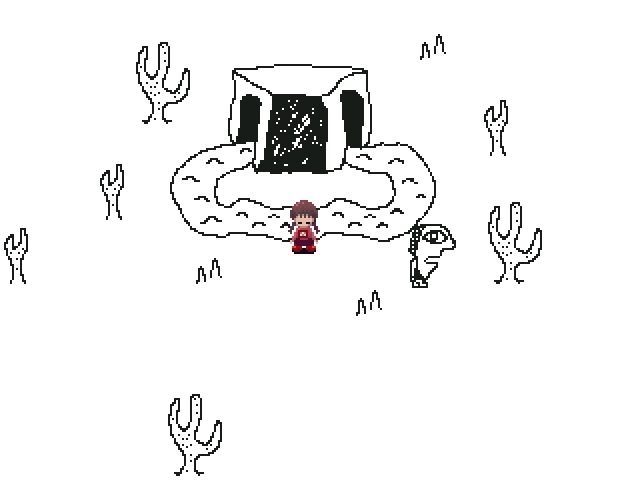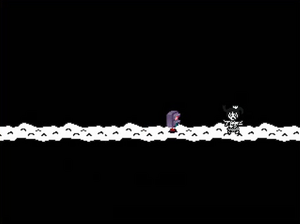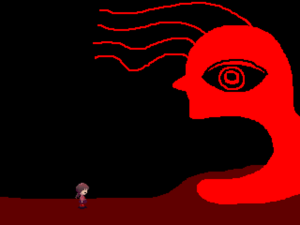>Mt.kiki No edit summary |
>Mt.kiki No edit summary |
||
| Line 61: | Line 61: | ||
[[File:Monoko(RLGL).png|thumb|Red light/Green light (sometimes abbreviated as RLGL) is a variation of statues.]] | |||
==[[Monoko]]([http://en.wikipedia.org/wiki/Statues_(game) Statues (game)])== | ==[[Monoko]]([http://en.wikipedia.org/wiki/Statues_(game) Statues (game)])== | ||
| Line 68: | Line 67: | ||
Red light/Green light (sometimes abbreviated as RLGL) is a variation of statues. The "it" person stands at one end of the playing field, with the rest of the players at the other end. "It" turns their back to the others and calls out "Green light!" The players then run as fast as they can towards "it". At any time, "it" can face the players, calling out "Red light", and the others must freeze in place. If anyone fails to stop, they are out or must return to the starting line. | Red light/Green light (sometimes abbreviated as RLGL) is a variation of statues. The "it" person stands at one end of the playing field, with the rest of the players at the other end. "It" turns their back to the others and calls out "Green light!" The players then run as fast as they can towards "it". At any time, "it" can face the players, calling out "Red light", and the others must freeze in place. If anyone fails to stop, they are out or must return to the starting line. | ||
[[File:Big_Red.png|thumb|"Big Red" is "Red Rover"?]] | |||
==[[Big Red]]([http://en.m.wikipedia.org/wiki/Red_Rover Red Rover])== | |||
Red rover (also known as '''forcing the city gates''' and '''octopus tag''') is an outdoor [http://en.m.wikipedia.org/wiki/Game <u>game</u>] played primarily by [http://en.m.wikipedia.org/wiki/Children <u>children</u>] on [http://en.m.wikipedia.org/wiki/Playgrounds <u>playgrounds</u>]. This 19th-century children's group game (requiring around 10 or more players total)<sup class="reference" id="cite_ref-ROVEABOUT_1-0">[http://en.m.wikipedia.org/wiki/Red_Rover#cite_note-ROVEABOUT-1 <u>[1]</u>]</sup> is thought to have originated in Britain and then spread to Australia, Canada and the United States. | |||
Røver is a Norwegian word for "pirate", so perhaps the early British were showing bravery by daring the Viking raiders to "come over". The 1829 book titled ''[http://en.m.wikipedia.org/wiki/The_Red_Rover <u>The Red Rover</u>]: A Tale'' by [http://en.m.wikipedia.org/wiki/James_Fenimore_Cooper <u>James Fenimore Cooper</u>] describes the exploits of a pirate called "Red Rover".<sup class="reference" id="cite_ref-2">[http://en.m.wikipedia.org/wiki/Red_Rover#cite_note-2 <u>[2]</u>]</sup> | |||
[[Category:Name]] | [[Category:Name]] | ||
Revision as of 06:27, 2 March 2013
Monoe(PHANTMa)
1998年7月20日
『serial experiments lain LAYER:4 RELIGION』#11:35~11:40
http://www.youtube.com/watch?v=qWuJr_1SOyM
http://ja.wikipedia.org/wiki/Serial_experiments_lain
2009年06月07日 10:30
"【ゆめにっき】そうだ、モノ江さんに会いに行こう。"#6:10~6:20
Added by "さんすう" http://www.nicovideo.jp/watch/sm7272248
Used by "さんすう" http://www.nicovideo.jp/user/11784773
Monoe(Tag (game))
Encoded by Kick Ass Anime(English Sub)
Come visit us @ irc.mircx.com #KickAssAnime
1998年7月20日
『serial experiments lain LAYER:4 RELIGION』 #13:35~14:15
http://ja.wikipedia.org/wiki/Serial_experiments_lain
Monoko(Statues (game))
Red light/Green light (sometimes abbreviated as RLGL) is a variation of statues. The "it" person stands at one end of the playing field, with the rest of the players at the other end. "It" turns their back to the others and calls out "Green light!" The players then run as fast as they can towards "it". At any time, "it" can face the players, calling out "Red light", and the others must freeze in place. If anyone fails to stop, they are out or must return to the starting line.
Big Red(Red Rover)
Red rover (also known as forcing the city gates and octopus tag) is an outdoor game played primarily by children on playgrounds. This 19th-century children's group game (requiring around 10 or more players total)[1] is thought to have originated in Britain and then spread to Australia, Canada and the United States.
Røver is a Norwegian word for "pirate", so perhaps the early British were showing bravery by daring the Viking raiders to "come over". The 1829 book titled The Red Rover: A Tale by James Fenimore Cooper describes the exploits of a pirate called "Red Rover".[2]




